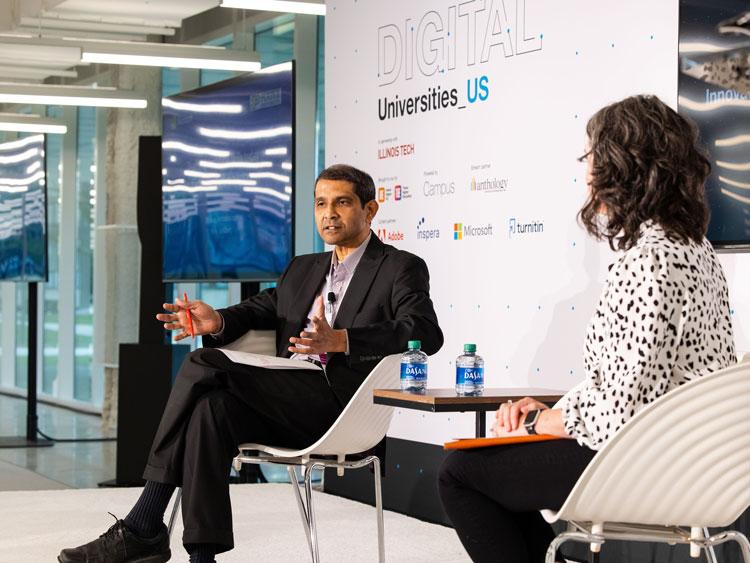
How can universities disrupt the gender investment gap?
Engaging with stakeholders beyond higher education and debunking myths around women and innovation can open spin-out opportunities to more women, writes Simonetta Manfredi

You may also like
Popular resources
This autumn we can expect quite a lot of talk about university spin-outs as the review commissioned by HM Treasury on this topic reports its findings and makes recommendations. University spin-outs are a real asset to the UK economy and its ambition to become a “science superpower”, as evidenced by more than five-fold increased investment to £5 billion in 2021.
But, how much of this investment has gone to spin-outs founded by women? Probably not much since only 19 per cent of all university spin-outs have at least one female founder and only 12 per cent have all female founders. We know from our research about the experiences of female founders that securing investment to create and grow their spin-outs can be more challenging for them than for their male counterparts. A lack of female investors only compounds this problem. The Women Angel Insights report, published by the UK Association of Business Angels (UKBAA), shows that women are more likely to invest in women’s companies. The problem is well summarised by the European Investment Bank: “a lack of female representation among founders and investors, gender investment bias and risk aversion create a vicious circle that is difficult to break”.
- How to encourage gender equity in interdisciplinary research
- Collection: Overcoming gender inequality in higher education
- What distinguishes a university from a knowledge enterprise?
Do we need to worry about this “vicious circle” and lack of female founders? After all, the figures above show that university spin-outs have done very well, even with so few of them.
Yes, we do. A powerful example of why this matters is the car seat belt. The three-point seat belt was developed in 1959 by men for male drivers. It was almost four decades before a female engineer, Laura Thackray, designed a pregnant crash-test dummy, which improved the technology to protect pregnant women. More examples can be found in the work of Londa Schiebinger about the importance of gendered innovations. This shows how gendered innovation can enable social equality. Therefore, the UK cannot afford to overlook women innovators if it wants to become a science superpower.
Disrupting the gender investment gap
So, how do we break the cycle that perpetuates the gender investment gap?
Universities need to work with stakeholders from the innovation ecosystem outside HE that influences the development of spin-outs, which in turn become part of it. Investors appear to be part of the problem. So, as I have previously argued on Campus, they need to become part of the solution.
To put this into practice, Oxford Brookes University joined forces with the Women Backing Women campaign led by female investors in UKBAA. This initiative was launched in response to the findings of the Alison Rose review of female entrepreneurs in the UK, which also highlighted the gender investment gap as an issue. We brought together female investors, founders and researchers, as well as representatives from UKRI, learned societies and business leaders, to discuss women, STEM and investment and how to close the gender gap. We proposed an aspirational double target of 30 per cent to increase both the proportion of university spin-outs with at least one female founder and of female business angels, to be achieved by 2030 or sooner. As Jenny Tooth, executive chair at UK Business Angels Association, said: “We know a key solution to getting more female founders is to get more female investors, and particularly to get more women with STEM backgrounds to become investors.” Contrary to what some may think, becoming a business angel does not require large sums of money, as they usually operate through syndicates.
So, what about creating a syndicate of women in STEM to invest in female-led spin-outs?
Debunking myths about women and innovation
Other deep-seated cultural issues in the wider innovation ecosystem must be tackled, such as the need to change the narrative about women in innovation; for example, dispelling the myth that creating and running a spin-out is incompatible with family life. Most of the women who took part in our research successfully founded spin-outs while raising young families.
We also need to dispel the myth about women and risk aversion, which is often confused with prudence. In fact, women can offer a dose of realism, which investor Lynne Cadenhead defines as advanced risk awareness and can be most beneficial when starting a business.
It is essential that universities allocate appropriate time to enable female researchers to balance an academic career with spin-out creation. They can also facilitate networks of “relatable mentors”, women who have successfully spun-out while raising a family.
To raise awareness about gender diversity issues in our regional innovation ecosystem, which our spin-outs are likely to interact with, we have collaborated with Advanced Oxford. This is a not-for-profit organisation with members drawn from R&D-based companies (which includes spin-outs) across Oxfordshire. Advanced Oxford published the Oxfordshire Innovation Engine 2023, which for the first time includes information about women’s representation as company founders and directors across the region. The collaboration involved surfacing equality and diversity issues, starting with gender, to address challenges and pursue opportunities.
The picture is not great, with only 18 per cent of companies with at least one female founder and only 4 per cent of companies with only female founders. These facts are a call to action since they show that the much-celebrated Oxfordshire innovation ecosystem needs to become more gender inclusive.
Many women and men in the innovation ecosystem want to make a difference. Universities can work with them to join the dots between initiatives such as the Women Backing Women campaign and support more women in spin-out leadership.
Simonetta Manfredi is a professor of equality and diversity management, and the director of research, innovation and enterprise at Oxford Brookes University.
If you would like advice and insight from academics and university staff delivered direct to your inbox each week, sign up for the Campus newsletter.


